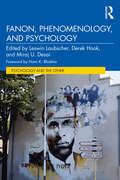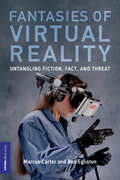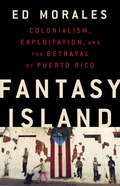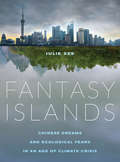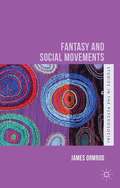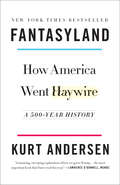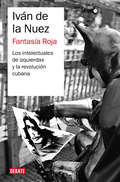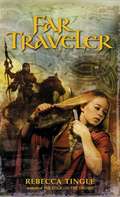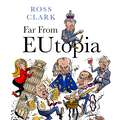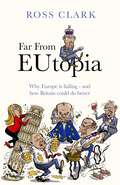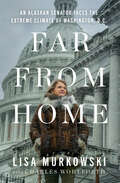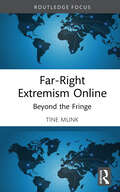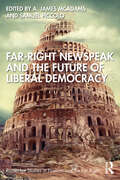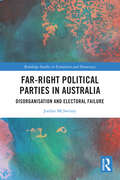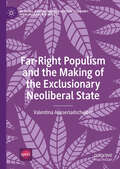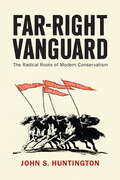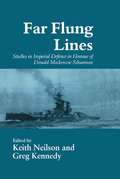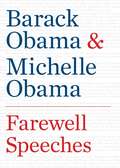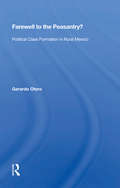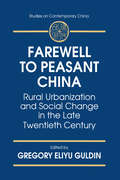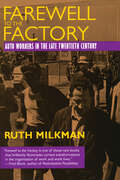- Table View
- List View
Fanon, Phenomenology, and Psychology (Psychology and the Other)
by Leswin Laubscher, Derek Hook, and Miraj U. DesaiFanon, Phenomenology, and Psychology is the first edited collection dedicated to exploring the explicitly phenomenological foundations underlying Frantz Fanon’s most important insights. Featuring contributions from many of the world’s leading scholars on Fanon, this volume foregrounds a series of crucial phenomenological topics – inclusive of the domains of experience, structure, embodiment, and temporality – pertaining to the analysis and interrogation of racism and anti-Blackness. Chapters highlight and expand Fanon’s ongoing importance to the discipline of psychology while opening compelling new perspectives on psychopathology, decolonial praxis, racialized time, whiteness, Black subjectivity, the "racial ontologizing of the body," systematic structures of racism and resulting forms of trauma, Black Consciousness, and Africana phenomenology. In an era characterized by resurgent forms of anti-Blackness and racism, this book is essential reading for students, scholars, and activists who remain inspired by Fanon’s legacy.
Fantasies of Virtual Reality: Untangling Fiction, Fact, and Threat (Strong Ideas)
by Marcus Carter Ben EglistonThe fantasies that underpin common perceptions of Virtual Reality—and what we need to know about VR&’s potential risks as well as its opportunities.Virtual reality is the next new frontier for Silicon Valley. Mark Zuckerberg, who has overseen Meta&’s investment of billions into VR, pitches it as the next dominant computing paradigm. More than just a gaming technology, VR is top of mind for academics, tech reportage, and industry evangelists who all see the potential for VR to revolutionize fields such as education and health, as well as the way we work and communicate. But will VR achieve all this? In Fantasies of Virtual Reality, Marcus Carter and Ben Egliston strip bare the tech industry&’s vision of a future dominated by immersive VR experiences, challenging the utopian promises of this technology&’s potential.Carter and Egliston offer a critical account of VR in a variety of contexts, from gaming to human resources to policing and the military. They argue that while VR does hold significant potential, the overhyped expectations surrounding it, from achieving true empathetic understanding to transforming traditional education and office work, are often overstated and fraught with issues of privacy, control, and exclusion. What&’s more, there is nothing truly virtual about virtual reality: VR is deeply entrenched in the material world, driven by tangible technological, economic, and social logics.An accessible introduction to this emerging technology, Fantasies of Virtual Reality is essential reading for anyone interested in what VR can really do—and what is just plain fantasy.
Fantasy Island: Colonialism, Exploitation, and the Betrayal of Puerto Rico
by Ed MoralesA crucial, clear-eyed accounting of Puerto Rico's 122 years as a colony of the US.Since its acquisition by the US in 1898, Puerto Rico has served as a testing ground for the most aggressive and exploitative US economic, political, and social policies. The devastation that ensued finally grew impossible to ignore in 2017, in the wake of Hurricane María, as the physical destruction compounded the infrastructure collapse and trauma inflicted by the debt crisis. In Fantasy Island, Ed Morales traces how, over the years, Puerto Rico has served as a colonial satellite, a Cold War Caribbean showcase, a dumping ground for US manufactured goods, and a corporate tax shelter. He also shows how it has become a blank canvas for mercenary experiments in disaster capitalism on the frontlines of climate change, hamstrung by internal political corruption and the US federal government's prioritization of outside financial interests.Taking readers from San Juan to New York City and back to his family's home in the Luquillo Mountains, Morales shows us the machinations of financial and political interests in both the US and Puerto Rico, and the resistance efforts of Puerto Rican artists and activists. Through it all, he emphasizes that the only way to stop Puerto Rico from being bled is to let Puerto Ricans take control of their own destiny, going beyond the statehood-commonwealth-independence debate to complete decolonization.
Fantasy Islands
by Julie SzeThe rise of China and its status as a leading global factory--combined with an increasing desire worldwide for inexpensive toys, clothes, and food--are altering the way people live and consume. At the same time, the world appears wary of the real costs of this desire: toys drenched in lead paint, dangerous medicines, and tainted pet food. Examining sites in China, including the plan for a new eco-city called Dongtan on the island of Chongming, suburbanization projects, and the Shanghai World Expo, Julie Sze interrogates Chinese, European, and American eco-desire and the eco-technological fantasies that underlie contemporary development of global cities and mega-suburbs. Sze frames her analysis of these case studies in the context of the problems of global economic change and climate crisis, and she explores the flows, fears, and fantasies of Pacific Rim politics that shaped plans for Dongtan. She looks at the flow of pollution from Asia to the United States (ten billion pounds of airborne pollutants annually). Simultaneously, she considers the flow of financial and political capital for eco-city and ecological development between elite power structures in the UK and China, and charts how climate change discussions align with US fears of China's ascendancy and the related demise of the American Century. Fantasy Islands examines how fears and fantasies about China and about historical and political power change the American imagination.
Fantasy and Social Movements
by James S. OrmrodIt is sometimes assumed that fantasizing stands in contrast to activism. This book, however, argues that fantasy plays a central role in social movements. Drawing on the psychoanalytic theories of Freud, Klein and Lacan, and psychosocial theories inspired by them, Fantasy and Social Movements examines the relationships between fantasy, reality, action, the unconscious and the collective. It makes a case for distinguishing between various 'modes of fantasy', which configure these relationships in different ways. Illustrated by a case study of activists who support the exploration, development and settlement of outer space, the book's theoretical arguments provide a platform for a critical psychosocial reworking of contemporary social movement theory. The result is a new typology of social movements that places fantasy at its core.
Fantasyland: How America Went Haywire: A 500-Year History
by Kurt Andersen<P>A razor-sharp thinker offers a new understanding of our post-truth world and explains the American instinct to believe in make-believe, from the Pilgrims to P. T. Barnum to Disneyland to zealots of every stripe . . . to Donald Trump. <P>In this sweeping, eloquent history of America, Kurt Andersen demonstrates that what’s happening in our country today—this strange, post-factual, “fake news” moment we’re all living through—is not something entirely new, but rather the ultimate expression of our national character and path. America was founded by wishful dreamers, magical thinkers, and true believers, by impresarios and their audiences, by hucksters and their suckers. Believe-whatever-you-want fantasy is deeply embedded in our DNA. <P>Over the course of five centuries—from the Salem witch trials to Scientology to the Satanic Panic of the 1980s, from P. T. Barnum to Hollywood and the anything-goes, wild-and-crazy sixties, from conspiracy theories to our fetish for guns and obsession with extraterrestrials—our peculiar love of the fantastic has made America exceptional in a way that we've never fully acknowledged. <P>With the gleeful erudition and tell-it-like-it-is ferocity of a Christopher Hitchens, Andersen explores whether the great American experiment in liberty has gone off the rails. From the start, our ultra-individualism was attached to epic dreams and epic fantasies—every citizen was free to believe absolutely anything, or to pretend to be absolutely anybody. <P>Little by little, and then more quickly in the last several decades, the American invent-your-own-reality legacy of the Enlightenment superseded its more sober, rational, and empirical parts. We gave ourselves over to all manner of crackpot ideas and make-believe lifestyles designed to console or thrill or terrify us. <P> In Fantasyland, Andersen brilliantly connects the dots that define this condition, portrays its scale and scope, and offers a fresh, bracing explanation of how our American journey has deposited us here. <P>Fantasyland could not appear at a more perfect moment. If you want to understand the politics and culture of twenty-first-century America, if you want to know how the lines between reality and illusion have become dangerously blurred, you must read this book. <P><b>A New York Times Bestseller</b> <P><b>A New York Times Bestseller</b>
Fantasía roja
by Iván de NuezUn repaso ácido e inteligente a la visión de muchos intelectuales europeos y americanos por el gobierno de Fidel Castro. ¿Qué tienen en común Jean-Paul Sartre y Oliver Stone, Régis Debray y Sydney Pollack, el músico Ry Cooder, que dio a conocer Buena Vista Social Club, y el director de cine Richard Lester, que dirigió a los Beatles, Giangiacomo Feltrinelli y Max Aub, Graham Greene y David Byrne? Además de ser o haber sido, cada uno a su manera y condición, reconocidos iconos intelectuales de la izquierda occidental, estos ilustres personajes han compartido su pasión por la Revolución cubana. A desentrañar las causas, profundas o banales, de esa pasión está dedicado Fantasía roja, un ensayo personal escrito con tanta profundidad conceptual como sentido del humor. Desde la filosofía o la música, la novela o el cine, el fuego y la ruina, el turismo y los desvencijados Cadillac, la teoría y la calle, este estudio indaga los misterios de esa fantasía y propone un debate sobre qué cabría esperar de una izquierda renovada para el siglo XXI.
Far Flies the Eagle: Rebel Princess, Curse Not The King, And Far Flies The Eagle (The Romanov Trilogy #3)
by Evelyn AnthonyImperial Russia's Czar Alexander I battles Napoleon for control of Europe After declaring himself Emperor of France following a sweeping victory in Europe, General Napoleon Bonaparte, the son of a poor Corsican lawyer, is ready for his next conquest. He has no doubt that he can defeat Austria, and is confident that Russia will soon follow. After all, he triumphed in revolution and recast an empire. What has he to fear from the twenty-nine-year-old czar of a barbaric country? The grandson of Catherine the Great, Alexander I is tall, irresistibly handsome, and known for his liberal leanings and winning ways with women who are not his wife. He ascended to the throne by murdering his father and is now determined to vanquish the French emperor. Napoleon will soon learn that he has a formidable adversary in Alexander. Sweeping from St. Petersburg to Paris, from the Kremlin to the battlefield, and filled with historic authenticity, Far Flies the Eagle offers a fascinating glimpse into the Romanov family, including the controversy surrounding Alexander's relationship with his beautiful, power-hungry sister, the Grand Duchess Catherine, whom Napoleon considers marrying if he can rid himself of his years-older wife Josephine. Far Flies the Eagle is the 3rd book in the Romanov Trilogy, but you may enjoy reading the series in any order.
Far Traveler
by Rebecca TingleWhen King Edward gives his niece AElfwyn two choices--marry one of his allies or become a nun--Wyn flees. Disguising herself as a boy, she adopts a new identity as a traveling storyteller and soon becomes embroiled in a plot against her own uncle. Sequel to The Edge on the Sword.
Far from Eutopia: How Europe is failing – and Britain could do better
by Ross ClarkIn 2020, after three and a half years of bitter negotiations, Britain left the European Union. For some it was a day of freedom, for others a tragedy which would leave Britain isolated and poorer. Vote Brexit, the Remain campaign warned us, and it would be an act of self-harm. The economy would collapse, sending prices and unemployment soaring. Meanwhile, in contrast to xenophobic, inward-looking Britain, the EU would soar ahead without us.But is that really what has happened? Ross Clark reveals just how badly the EU is doing - and how in many ways Britain is doing better. Since Brexit, for example, the UK economy has grown faster than Germany's. In spite of inflation which followed the pandemic and the invasion of Ukraine, Britain has the lowest food prices in Europe. The air is cleaner than in many countries. Despite recent events surveys suggest there is less racism and xenophobia in Britain than in almost any other European country.For years, European economies have been far more sluggish than those of other developed countries. In the absence of economic growth and with high migration, European societies are strained. The far right is advancing and public disillusionment with the EU growing quickly. While Britain shares many of Europe's problems to a greater or less extent, this hard-hitting polemic argues that it now has the means to disentangle itself from the EU's draw strings set off on a more prosperous path.
Far from Eutopia: How Europe is failing – and Britain could do better
by Ross ClarkIn 2020, after three and a half years of bitter negotiations, Britain left the European Union. For some it was a day of freedom, for others a tragedy which would leave Britain isolated and poorer. Vote Brexit, the Remain campaign warned us, and it would be an act of self-harm. The economy would collapse, sending prices and unemployment soaring. Meanwhile, in contrast to xenophobic, inward-looking Britain, the EU would soar ahead without us.But is that really what has happened? Ross Clark reveals just how badly the EU is doing - and how in many ways Britain is doing better. Since Brexit, for example, the UK economy has grown faster than Germany's. In spite of inflation which followed the pandemic and the invasion of Ukraine, Britain has the lowest food prices in Europe. The air is cleaner than in many countries. Despite recent events surveys suggest there is less racism and xenophobia in Britain than in almost any other European country.For years, European economies have been far more sluggish than those of other developed countries. In the absence of economic growth and with high migration, European societies are strained. The far right is advancing and public disillusionment with the EU growing quickly. While Britain shares many of Europe's problems to a greater or less extent, this hard-hitting polemic argues that it now has the means to disentangle itself from the EU's draw strings set off on a more prosperous path.
Far from Eutopia: How Europe is failing – and Britain could do better
by Ross ClarkIn 2020, after three and a half years of bitter negotiations, Britain left the European Union. For some it was a day of freedom, for others a tragedy which would leave Britain isolated and poorer. Vote Brexit, the Remain campaign warned us, and it would be an act of self-harm. The economy would collapse, sending prices and unemployment soaring. Meanwhile, in contrast to xenophobic, inward-looking Britain, the EU would soar ahead without us.But is that really what has happened? Ross Clark reveals just how badly the EU is doing - and how in many ways Britain is doing better. Since Brexit, for example, the UK economy has grown faster than Germany's. In spite of inflation which followed the pandemic and the invasion of Ukraine, Britain has the lowest food prices in Europe. The air is cleaner than in many countries. Despite recent events surveys suggest there is less racism and xenophobia in Britain than in almost any other European country.For years, European economies have been far more sluggish than those of other developed countries. In the absence of economic growth and with high migration, European societies are strained. The far right is advancing and public disillusionment with the EU growing quickly. While Britain shares many of Europe's problems to a greater or less extent, this hard-hitting polemic argues that it now has the means to disentangle itself from the EU's draw strings set off on a more prosperous path.
Far from Home: An Alaskan Senator Faces the Extreme Climate of Washington, D.C.
by Lisa MurkowskiA voice of reason in a polarized U.S. Senate, Lisa Murkowski of Alaska tells the story of how she learned to adapt to the harsh climate of Washington, D.C., and issues a fervent appeal for a politics grounded in compromise and compassion.&“Two paths diverged—Lisa Murkowski took the one less traveled. In Far from Home, we see how the solitary course she chose has made all the difference.&”—Senator Mitt RomneyLisa Murkowski has repeatedly stood at the center of our nation&’s most challenging issues, serving as a swing vote and a voice willing to challenge the president, regardless of who holds the office. In this candid memoir that offers hope for a functional Washington, she guides readers through the defining events of her more than twenty-year career: her beginnings in Alaska and appointment to the U.S. Senate, the rise of the Tea Party and her historic 2010 write-in reelection campaign, and the pivotal events of the Trump era, including her vote against Brett Kavanaugh&’s confirmation to the U.S. Supreme Court, the 2020 election, January 6, the impeachment trials, the overturning of Roe, and Trump&’s second election.Written at a time when Americans&’ trust in their institutions is in crisis, Far from Home is a candid account of how things get done in Washington. It is an uplifting narrative for anyone seeking reassurance that our political system can still work.
Far-Right Ecologism: Environmental Politics and the Far Right in Hungary and Poland (Routledge Studies in Fascism and the Far Right)
by Balša LubardaFar-Right Ecologism explains how the ongoing mainstreaming of the far right has prompted greater engagement with a range of topics, including the environment. Behind the façade of vote-winning strategies, the far right has provided a substantive ideological engagement with the natural environment. Building on the nationalist bent of early green thought and the perceived nexus of pristine nature and cultural purity, Far-Right Ecologism has ideologically adopted the green elements of other ideologies, such as conservatism and fascism, but also of those considered to be ‘thin-centred’, such as nationalism and populism. Through an authentic experience of learning from the Eastern European, post-socialist realms, this book explores the ideology, ecological discourse, and policy proposals behind the increasing impact of far-right actors on environmental politics in Hungary and Poland. Each chapter begins with stories from the interviewees to illustrate how the far right in Hungary and Poland attempts to permeate environmental politics and even forge partnerships with green actors through specific, local-based policy contributions. Drawing on the findings from a range of sources, such as electoral programs, ideological texts and manifestos, social media and public speeches, policy proposals, and more than forty in-depth interviews with far-right representatives, this book also assesses epistemological and methodological challenges in examining the environmental dimension of far-right, post-socialist politics. The book will be valuable reading for researchers with an interest in the far right, environmental politics and Central Eastern Europe.
Far-Right Extremism Online: Beyond the Fringe (Routledge Studies in Digital Extremism)
by Tine MunkBy imparting crucial insights into the digital evolution of far-right extremism and its challenges, this book explores how far-right extremism has transformed, utilising digital spaces for communication and employing coded language to evade detection.Far-right extremism has spread extensively across online platforms. Flourishing within echo chambers, these groups propagate different types of online and offline actions and advance their hateful ideologies to a wide-ranging audience. This book highlights the issues surrounding far-right extremism, which distinguishing it from terrorism and examining its contemporary digital manifestations. Importantly, it sheds light on how far-right groups utilise online platforms for communication, radicalisation, and on-ground actions, relying on alternative truths, misinformation, conspiracy theories, fashion, and memes to connect with like-minded individuals. The book also addresses content moderation challenges and the impact of rising populism in today’s political climate, which fuels societal divisions and uncertainty.Far-Right Extremism Online is a valuable resource for academics, students, analysts, and professionals working in counter-extremism, cybersecurity, digital communication, and national security. It is also an indispensable guide for those concerned about far-right extremism in the digital age.
Far-Right Newspeak and the Future of Liberal Democracy (Routledge Studies in Fascism and the Far Right)
by A. James McAdams Samuel PiccoloThis book is the first systematic, multicountry exploration of far-right Newspeak.The contributors analyze the ways in which contemporary far-right politicians, intellectuals, and pundits use and abuse traditional liberal concepts and ideas to justify positions that threaten democratic institutions and liberal principles. They explore cases of both far-right and right-wing thought in eastern and western Europe, the United States, and Canada. Subjects include well-known figures, such as Marine Le Pen, Tucker Carlson, Peter Thiel, Nick Griffin, Thierry Baudet, Jordan Peterson, Russell Brand, and Viktor Orbán, and lesser-known names, such as the Czech politician Tomio Okamura and the Internet personality "Raw Egg Nationalist." The contributors examine these figures’ claims about hot-button issues, including immigration, Islam, race, Covid-19 policies, feminism, monetary policy, and free speech. The book demonstrates that mainstream politicians and intellectuals are at risk of losing control over the definitions of the very concepts, including equal rights, racial and ethnic diversity, and political tolerance, that undergird their vision of liberal democracy.It will be of interest to scholars, journalists, policymakers, political scientists, historians, political theorists, sociologists, and general audiences concerned about the sophisticated efforts of far-right and right-wing politicians and pundits to undermine the foundations of liberal democracy.
Far-Right Political Parties in Australia: Disorganisation and Electoral Failure (Routledge Studies in Extremism and Democracy)
by Jordan McSwineyThis book examines how Australian far-right parties organise and operate to better understand their limited electoral success. Australian far-right parties have yet to see results comparable to far-right parties in other contexts. Unlike many of their European counterparts that have made significant electoral gains up to and including participation in national governments, the Australian far-right parties of the ‘fourth wave’ have experienced relatively poor electoral results. But this does not necessarily mean that Australia is uniquely hostile to far-right politics. Focusing particularly on the 2019 Australian federal election, this book takes an organisational approach to better understand why Australian far-right parties struggle electorally. Through the novel lens of disorganised parties, the author argues that the failure to develop a functioning party organisation has resulted in Australian far-right parties being unable to effectively navigate their political environment. By focusing on disorganisation, this book provides a new perspective for understanding the limited electoral impact of the far right in Australia today, despite favourable conditions like normalised Islamophobia and growing dissatisfaction with mainstream parties. This book will be of interest to scholars and students of party politics, the far right, populism, and Australian politics.
Far-Right Politics in Europe
by Jean-Yves CamusJean-Yves Camus and Nicolas Lebourg’s critical look at the far right throughout Europe reveals a prehistory and politics more complex than the stereotypes suggest and warns of the challenges it poses to the EU’s liberal-democratic order. These movements are determined to gain power through legitimate electoral means, and they are succeeding.
Far-Right Populism and the Making of the Exclusionary Neoliberal State (Building a Sustainable Political Economy: SPERI Research & Policy)
by Valentina AusserladscheiderThis book examines the rise of exclusionary neoliberalism by assessing how far-right populist actors impact economic policy change. Drawing on the case of the Austrian Freedom Party, the book illustrates how neoliberalism emerged as a far-right political project in Austria. Tracing the Freedom Party´s ideational history, the book describes the making of the exclusionary neoliberal state through its establishment in the 1980s, its implementation in the early 2000s and how exclusionary neoliberalism was sustained after the Great Financial Crisis of 2008. The book thereby provides important insights on how domestic politics respond to challenges imposed by globalization and international market integration, and explains the less obvious ways in which exclusionary nationalist ideas can be deeply entangled with neoliberalism. The book will appeal to all those interested in far-right populism and its interrelation with political economy.
Far-Right Vanguard: The Radical Roots of Modern Conservatism (Politics and Culture in Modern America)
by John S. HuntingtonDonald Trump shocked the nation in 2016 by winning the presidency through an ultraconservative, anti-immigrant platform, but, despite the electoral surprise, Trump's far-right views were not an aberration, nor even a recent phenomenon. In Far-Right Vanguard, John Huntington shows how, for almost a century, the far right has forced so-called "respectable" conservatives to grapple with their concerns, thereby intensifying right-wing thought and forecasting the trajectory of American politics. Ultraconservatives of the twentieth century were the vanguard of modern conservatism as it exists in the Republican Party of today.Far-Right Vanguard chronicles the history of the ultraconservative movement, its national network, its influence on Republican Party politics, and its centrality to America's rightward turn during the second half of the twentieth century. Often marginalized as outliers, the far right grew out of the same ideological seedbed that nourished mainstream conservatism. Ultraconservatives were true reactionaries, dissenters seeking to peel back the advance of the liberal state, hoping to turn one of the major parties, if not a third party, into a bastion of true conservatism.In the process, ultraconservatives left a deep imprint upon the cultural and philosophical bedrock of American politics. Far-right leaders built their movement through grassroots institutions, like the John Birch Society and Christian Crusade, each one a critical node in the ultraconservative network, a point of convergence for activists, politicians, and businessmen. This vibrant, interconnected web formed the movement's connective tissue and pushed far-right ideas into the political mainstream. Conspiracy theories, nativism, white supremacy, and radical libertarianism permeated far-right organizations, producing an uncompromising mindset and a hyper-partisanship that consumed conservatism and, eventually, the Republican Party.Ultimately, the far right's politics of dissent—against racial progress, federal power, and political moderation—laid the groundwork for the aggrieved, vitriolic conservatism of the twenty-first century.
Far-flung Lines: Studies in Imperial Defence in Honour of Donald Mackenzie Schurman (Cass Series: Naval Policy and History #Vol. 2)
by Keith Neilson Greg KennedyThese studies show how the British Empire used its maritime supremacy to construct and maintain a worldwide defence for its imperial interests. They rebut the idea that British defence policy in the late 19th and early 20th centuries was primarily concerned with the balance of power in Europe.
Farewell Speeches
by Barack Obama Michelle ObamaThe final speeches of the 44th President of the United States, Barack Obama, and First Lady Michelle Obama. Both speeches were instant and moving landmarks, as well as stirring testaments to the time this inspiring and beloved couple spent in the White House.
Farewell To The Peasantry?: Political Class Formation In Rural Mexico
by Gerardo OteroFarewell to the Peasantry? questions class-reductionist assumptions in certain Marxist and populist approaches to political movements in twentieth-century rural Mexico, highlighting the interpretation of the process of political class formation.
Farewell to Peasant China: Rural Urbanization and Social Change in the Late Twentieth Century (Studies On Contemporary China)
by Gregory Eliyu GuldinChinese urbanization, including the daily life, migration strategies, and life choices of villagers and townspeople, is the focus of this study by Chinese and North American scholars. The study looks at the urbanization process and the vitality of post-reform Chinese society.
Farewell to the Factory: Auto Workers in the Late Twentieth Century
by Ruth MilkmanThis study exposes the human side of the decline of the U.S. auto industry, tracing the experiences of two key groups of General Motors workers: those who took a cash buyout and left the factory, and those who remained and felt the effects of new technology and other workplace changes. Milkman's extensive interviews and surveys of workers from the Linden, New Jersey, GM plant reveal their profound hatred for the factory regime—a longstanding discontent made worse by the decline of the auto workers' union in the 1980s. One of the leading social historians of the auto industry, Ruth Milkman moves between changes in the wider industry and those in the Linden plant, bringing both a workers' perspective and a historical perspective to the study.Milkman finds that, contrary to the assumption in much of the literature on deindustrialization, the Linden buyout-takers express no nostalgia for the high-paying manufacturing jobs they left behind. Given the chance to make a new start in the late 1980s, they were eager to leave the plant with its authoritarian, prison-like conditions, and few have any regrets about their decision five years later. Despite the fact that the factory was retooled for robotics and that the management hoped to introduce a new participatory system of industrial relations, workers who remained express much less satisfaction with their lives and jobs.Milkman is adamant about allowing the workers to speak for themselves, and their hopes, frustrations, and insights add fresh and powerful perspectives to a debate that is often carried out over the heads of those whose lives are most affected by changes in the industry.
